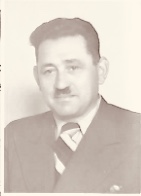Born: Oedheim, Germany, 25 December 1894
Profession in country of origin: Farmer
Arrived in Britain as a refugee from Germany on 21 June 1939 (a passenger from the St Louis)
Documents
Male enemy alien - Exemption from internment - Refugee Surname: Mannheimer Forename: Siegfried Alias: - Date and place of birth: 25/12/1894 in Oedheim Nationality: German Police Regn. Cert. No.: 711 843 Home Office ref: M 1997(?)0 Address: Kitchener camp, Richborough, Sandwich, Kent Normal occupation: Farmer Present occupation: Air Raid Warden in the Camp Name and address of employer: - Decision of tribunal: Exempted "C" & 9a Date 03.10.1939 Whether exempted from Article 6(A): Yes Whether desires to be repatriated: No Hand-written later additions: Rtn and release auth Cat 7 C Bucks WACE (?) 08.01/1942 Interned EC Released Australia
Source: National Archives, Home Office: Aliens Department: Internees Index, 1939-1947.
Editor’s note: We are not allowed to reproduce National Archives (UK) images, but we are permitted to reproduce the material from them, as shown above.
We also found an extensive file on Siegfried Mannheimer: in excess of 60 pages of documents at the Australian National Archives, as follows:
| Series number | Control symbol |
| A367 | C63746 |
| MP1103/1 | E40178 |
| MP1103/2 | E40178 |
Memories
Siegfried Mannheimer was born on 25th December 1894 in Oedheim, Heilbronn, Germany. He was the son of Max Mannheimer and his wife Emma, née Aaron. He had two brothers and three sisters.
Although the family had been based in and around Oedheim for many generations, family members had been gradually emigrating to the USA since the late 1800s, and in the summer of 1909, when he was 14, Siegfried also went to America, arriving in New York in August 1909. He was travelling with his uncle Ike Mannheimer (more of whom later in the story), and was listed as a student. His destination was Rochester, NY, where several members of the Mannheimer family were based. In the 1910 census he appears as a farm labourer in Gaines, about 30 miles from Rochester.
However, Siegfried did not stay in the USA, because according to later files, he was called up to the German army in 1914 and served as a Private in the infantry until discharged at the end of the war in 1918.
By 1920 Siegfried was back in Oedheim working as a cattle farmer with his brother Erwin. (There is quite a bit to be found about the antisemitic atmosphere in the Heilbronn area online).
In 1934 he married Hermine Bohe in Stuttgart. By this time his father had died and his mother, brother Benno, and three sisters had all left Germany and were living in Rochester, NY. Uncle Ike was travelling across the Atlantic regularly, working in import/export, but also helping family members get out of Germany. In particular, he took Erwin’s two sons who were eight and nine years old in December 1938.
In 1938 Siegfried was arrested and sent to Welzheim concentration camp, and his brother Erwin was sent to Dachau and then Buchenwald. It seems that Seigfried was released on condition he left Germany. In May 1939 he boarded the MS St Louis, which was taking almost 1,000 refugees to Cuba. His wife Hermine stayed in Germany. His brother Erwin also got out of Germany, travelling with his wife Rita, possibly in early 1939, aboard either the Koenigstein or the Cariba (to be confirmed), which took Jewish refugees to South America . They settled permanently in Venezuela; their two sons remained in the USA.
Siegfried’s voyage on the St Louis must have been awful – it is known as the “Voyage of the Damned”. Despite setting off full of hope, with permission to go to Cuba, when it arrived the ship was refused entry. The USA and Canada also turned the refugees away. So, the ship returned to Europe, where the passengers were given leave of entry to England, France, Belgium, and the Netherlands. Siegfried was one of those who went to Kitchener camp in Kent, and he appears on a list there, from October 1939, helping out as an Air Raid Warden. However, in May 1940 he was interned and taken to the Isle of Man before being ‘deported’ to Australia.
Siegfried was then a passenger on the notorious HMT Dunera, sailing from Liverpool in July 1940 to Sydney. On this terrible voyage, his belongings were stolen – a list of them can be found in his Australian National Archives file – and it must have been an awful experience, although we don’t know if he suffered the worst of the hardships and tortures of the Jewish passengers on this infamous voyage.
On arrival in Australia he was taken to an internment camp in New South Wales, called Hay Camp, and then transferred to Tatura Camp, Victoria. There are numerous papers in the Australian archives, one of which states that he ‘is very sulky’, and there are letters of complaint from Siegfried about how long it was taking for his compensation to come through for his belongings that were stolen on the Dunera. There is also a letter from Uncle Ike, in the USA, asking that Siegfried be found useful work. He was released from internment in September 1943, and got a job in Melbourne.
Siegfried’s wife Hermine came through the war and was able to join him in Australia, and in 1949 they both flew from Sydney to San Francisco – presumably travelling on to Rochester to spend time with his family.
They both remained permanently resident in Australia, living in Melbourne.
Siegfried died in March 1961, aged 66.
Kindly submitted by Cathy Mosely for her relative Siegfried Mannheimer
Photographs

Kindly submitted by Cathy Mosely for her relative Siegfried Mannheimer
